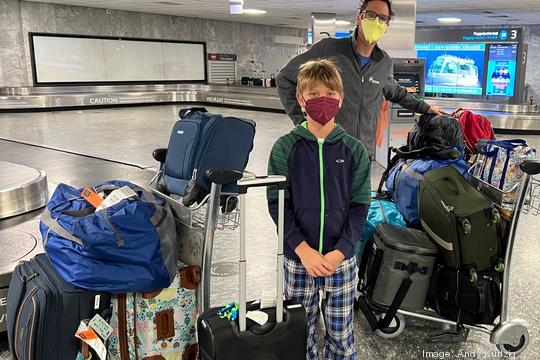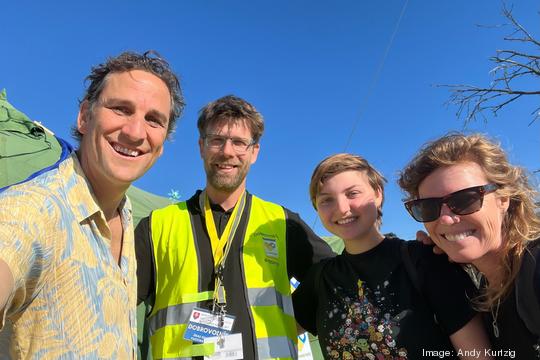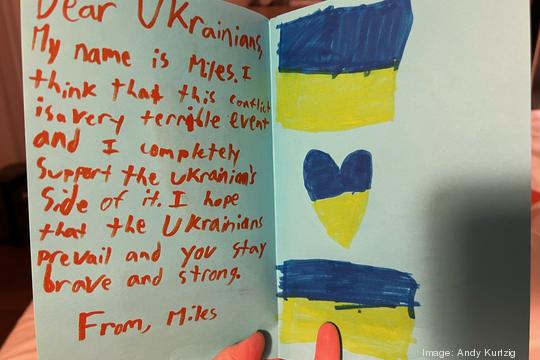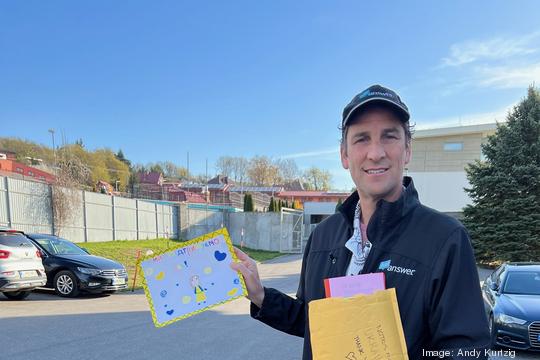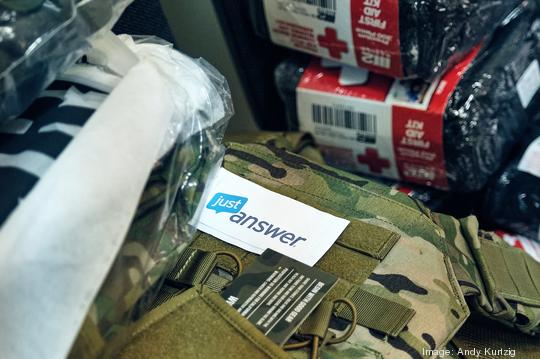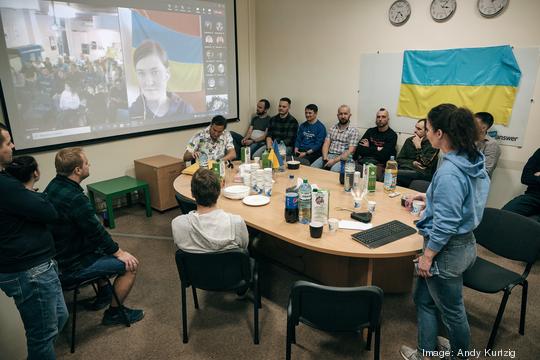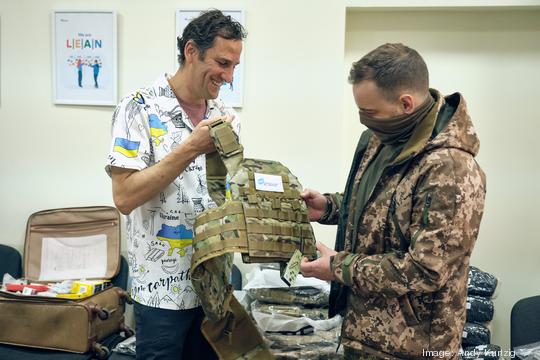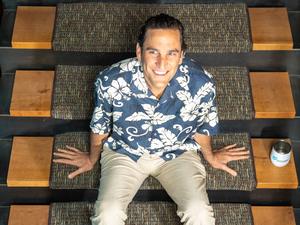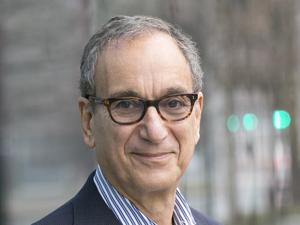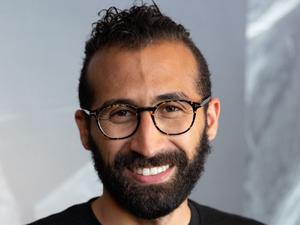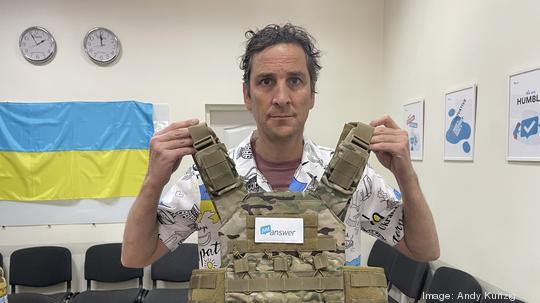
Lots of tech companies have a presence in Ukraine, including several startups in the Bay Area, but it's probably safe to assume that most executives based in the U.S. are checking in with employees and contractors remotely as Russia continues attacking the Eastern European country.
Not Andy Kurtzig. His company, JustAnswer, has been in constant contact with its Ukrainian team, of course, but Kurtzig decided to hand-deliver supplies and visit his team there in person. So on April 9, he flew to Europe with his wife, Sara, and three children: Jamie, 17, Kelly, 13, and Kai, 12. They spent just over a week traveling through five countries, including Poland, Slovakia and Hungary.
Kurtzig also crossed the border into Ukraine himself, with the help of one of his employees, and spent around 10 hours in the country — in addition to the seven-plus hours it took just to get across and back. I spoke to Kurtzig earlier this week about the experience, what he thinks other business leaders should do to support Ukraine and whether he plans to go back.
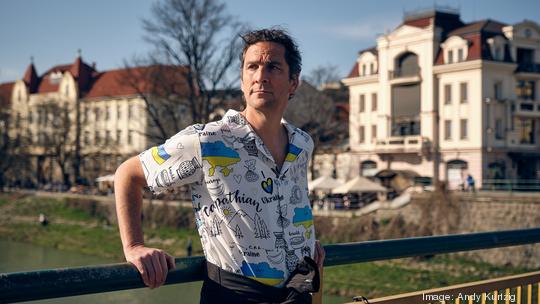
This was a very unique spring break. Where along Ukraine’s border were are you at various points? The first adventure was just trying to get all these supplies — eight giant bags filled with body armor and medical supplies and drones and night-vision goggles — across five borders was quite nerve wracking and stressful, but with a little bit of luck and some advanced planning, and we made it all the way through. Definitely stressful trying to try to get all those things across Hungary, in particular. It hasn’t been particularly friendly to the Ukrainian side and is not allowing many supplies for Ukraine to make it across their borders. So we were nervous about that, but our flight got in at like 2 in the morning and all the customs people were sleeping. So it ended up being easy.
Then in Budapest, we met with one of our employees who was running low on insulin. Most people with Type 1 diabetes have a month supply or so but the war was already a month in. We not only got him a bunch of new insulin, but we upgraded him to an artificial pancreas.
Is he going to be able to restock his own insulin sustainably now that he's in Hungary? Unfortunately it's hard for him to get it even though he's in Hungary. They don't want you to be getting things twice, like insulin or any drugs. He gets health care through Ukraine, and Hungary is willing to give him health care but only if he disavows his Ukrainian health care like for a year or some long period of time. He doesn't want to do that, right? He's hoping his country wins.
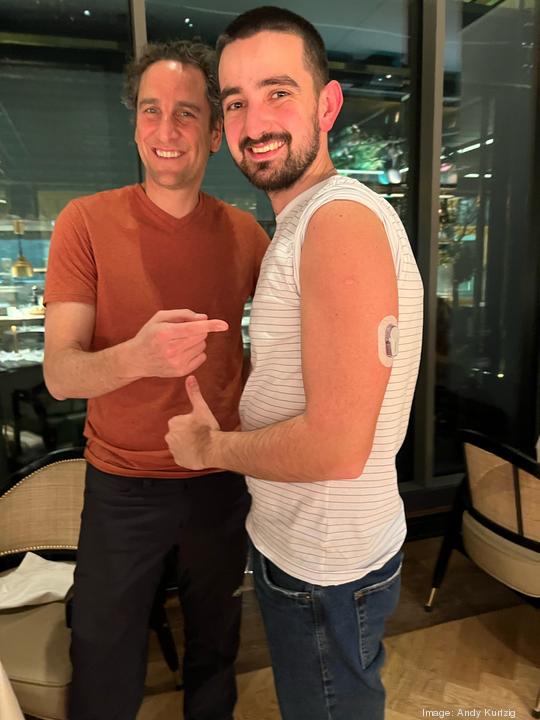
You and your family met with refugees as well, correct? That's right. So from Budapest, we drove in a rental car across the border into Slovakia. We saw the refugee camps, the tent cities, on the Slovakian side. We gave them some of the notes from Californian children that we had collected before our trip. We had hundreds and hundreds of these letters. And met some of the volunteers there and learned about the operation and what they're doing and how they were helping the refugees.
They had everything you can imagine there. This is more of a transition spot. Most of the refugees were on their way somewhere else. And so most people at these refugee centers were only there for a maximum of a couple days. A big piece of what they were doing was actually logistics. Helping you get the bus to wherever you're trying to get to. They said they get about 2,000 refugees a day at that particular border.
And how did your kids respond to the situation? It was just a very fulfilling, good for the soul kind of a trip. I think they learned a lot. And I think it was just good for their soul. Usually we would have gone to Hawaii. My mom lives there and that's where we typically go for spring break. It's a wonderful vacation. It's good for your tan and your happiness, but it's not good for your soul. This trip was good for the whole family. We were really helping people and making a difference in a very tangible way.
The day before I went into Ukraine, the kids and Sara volunteered, so they volunteered at another refugee center nearby the next day while I went into Ukraine. My head of office came [Nadia] and picked me up first thing in the morning. She's female which is why she's allowed to cross the border because of martial law. That was quite a busy day in Ukraine. Seventeen hours door-to-door.
Can you just walk me through that whole experience of crossing the border? It took about three-and-a-half hours to cross the border in, and about four hours on the way back out of Ukraine. There were looking for different things. On the way in, they're looking to make sure the Russians are not sneaking in military and equipment that might help the Russians.
The first thing we saw was a line of semi trucks, 18-wheelers, stopped miles long. We stopped to talk to one of the truckers, a woman trucker. Getting in and out of Ukraine is difficult if you're a male trucker, so women are driving the trucks that we saw. They were cooking breakfast while they're standing in this long line. They were telling us it takes about 23 hours for the trucks to get in. So you just put your truck in park and wait until they let you move one truck forward. It's part of the reason for our trip. We mailed some supplies to Ukraine right when the war started and it just never made it there.
It would have been quicker, probably, but then customs opened the trunk and saw the body armor and drones and night vision goggles and put us in the slow line again, to get a triple check on that stuff, which took another hour. It would have been a lot longer than an hour except that we had a really beautiful document from the 24th regiment of the Ukrainian defense that we applied for and gotten in advance. We were able to show them this letter from the military to me for bringing these supplies.
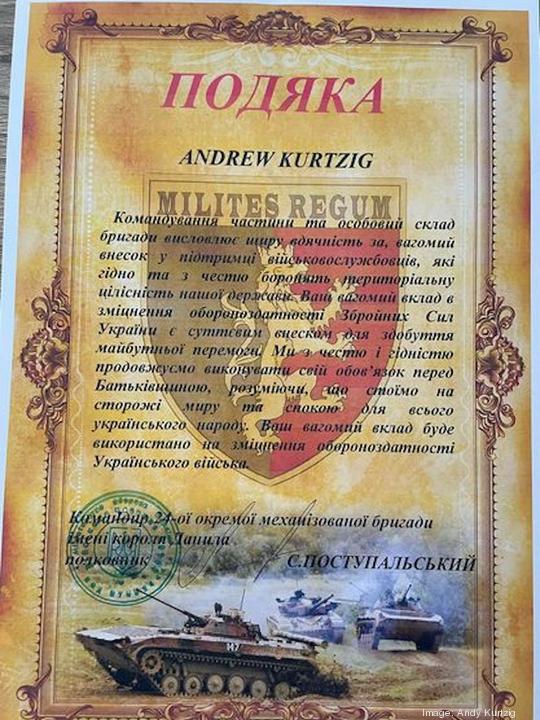
So you finally get into Ukraine. What was that like? Yeah. So Nadia drove me in her car. She came to pick me up and then we drove back in. We made it to the office and it was really emotional. The first couple hours, just hugs and tears. Just joyful to see each other and connect and tears over the travesties and what's happening to their fellow countrymen and women and children. We lived in Ukraine in 2019. I visit Ukraine at least twice a year. These are not just my colleagues, these are my friends. And my kids' friends and my wife's friends.
Your wife and kids did not cross though, correct? They did not. They stayed in Eastern Europe in Slovakia while I was in Ukraine.
And which office did you visit? Lviv or Uzhhorod? We went to the office in Uzhhorod.
Because Lviv is not safe anymore. That's right. There were some bombings, again. We were on a call with one of our guys as the bombs were landing there. But there were no deaths. They're going after military things. Logistics. That's what they're going after now, which is terrible, but at least people are not dying.
And since we last talked in April, has anybody else relocated? They're shifting around. I think they're assessing how safe it is and making adjustments all the time. The week I was there was the week before Easter, and it was actually feeling a bit safer. And so people were starting to come from Europe back into Ukraine to spend time with their family members for Easter. But the day I was there was actually the day that Ukraine sank the Moskova, the Russian warship. That was great. So that's part of the joy with high-fives about that. But as you know, Russia intensified the vessel strikes after that, as well. And then missiles, later that day, were heading our way. Air raid sirens were running and it was quite scary.
There were sirens going off while you were there but no missile strikes near where you were? In this particular case, we were safe but it could have landed anywhere. And so it was scary. That also just really brought home how scary it is for all of our folks. These air sirens go off roughly every day at random different times. For two months straight. It really drains you over time.
Is everyone on your staff still safe? Yep, they are still safe, still 100% alive. Even the ones that are serving in the military. We're still doing everything we can to keep it that way.
Has the recent development with Russia seeming to pivot more toward western Ukraine changed or shifted your own strategy for trying to make sure that your employees are safe? Unfortunately, there's not much we can do for the men, at least, and the women who choose to stay there. The west is still the safest part of Ukraine even though Russia is continuing to send missiles. If you have to be stuck in Ukraine, these are the best places to be. We're continuing to support them.
How much supplies were you actually able to bring over? So 100% of it made it through, which is great. We had about eight giant suitcases filled with supplies. Things like body armor, drones, night vision goggles, range finders, medical supplies, tourniquets, they're out of tourniquets, you can imagine why pretty. It's a pretty brutal situation.
JustAnswer CEO Andy Kurtzig in Ukraine
You were there for a little less than a day, right? So after I saw my folks that morning, we then handed out all the supplies to the different folk. One of our employees who volunteered to join the military actually came in and got his body armor and other supplies that he requested. And then doled out the rest of the total to different people that are in charge of distributing it to relevant parties.
You know, this war is about bombs and tanks and Russia's aggression, but it's also about the economy and sanctions and business. I feel like it's my duty, and I hope that other companies will follow suit and support the Ukrainian economy. And then we went to a refugee center and to a food kitchen and brought a truckload of supplies to them. In addition to the bags that I brought across, were able to get another truckload of supplies, food for the food kitchen and bedding and shampoo and things like that.
If business leaders want to support Ukraine in some way, is it as simple as opening up job positions for people in Ukraine? Yes, that's the best way. There's not a lot of Ukrainian products available. You can't just go to Safeway or wherever you shop and buy a bunch of Ukrainian things. Believe me, we've tried. Whereas there's a lot of tech.
And they're typically using their salaries to help their government in their economy. So for example, our employees are overpaying their taxes and pre-paying their taxes to support their government right now. They're also overpaying and pre-paying their bills like gas and electric and internet and cell phone bills or whatever else they can to support the economy right now. They're buying war bonds.
When you entered Ukraine, security was obviously trying to make sure that no Russians were sneaking anything or anyone in through the West. But what about leaving? So, after having dinner with all my colleagues, and then we're starting to pack up to go and that's when the air raid sirens started going off. We got the car and started trying to head out of the country. But then of course, we were stuck for four hours at the border. So we were in Ukraine as the missiles fell. It was so scary. Why did it take four hours on the way out? They were trying to make sure that men weren't sneaking out. They took an extra look at me. They don't see many Americans coming in or out of Ukraine.
Would you do it all over again? Absolutely. We're already thinking about the next trip. Friday night, we've got a big fundraiser for Ukraine at the Sweetwater Music Hall in Mill Valley. After that, we're going to start thinking about maybe another trip this summer. Maybe without the kids this time. We want to keep helping in any way we can.
